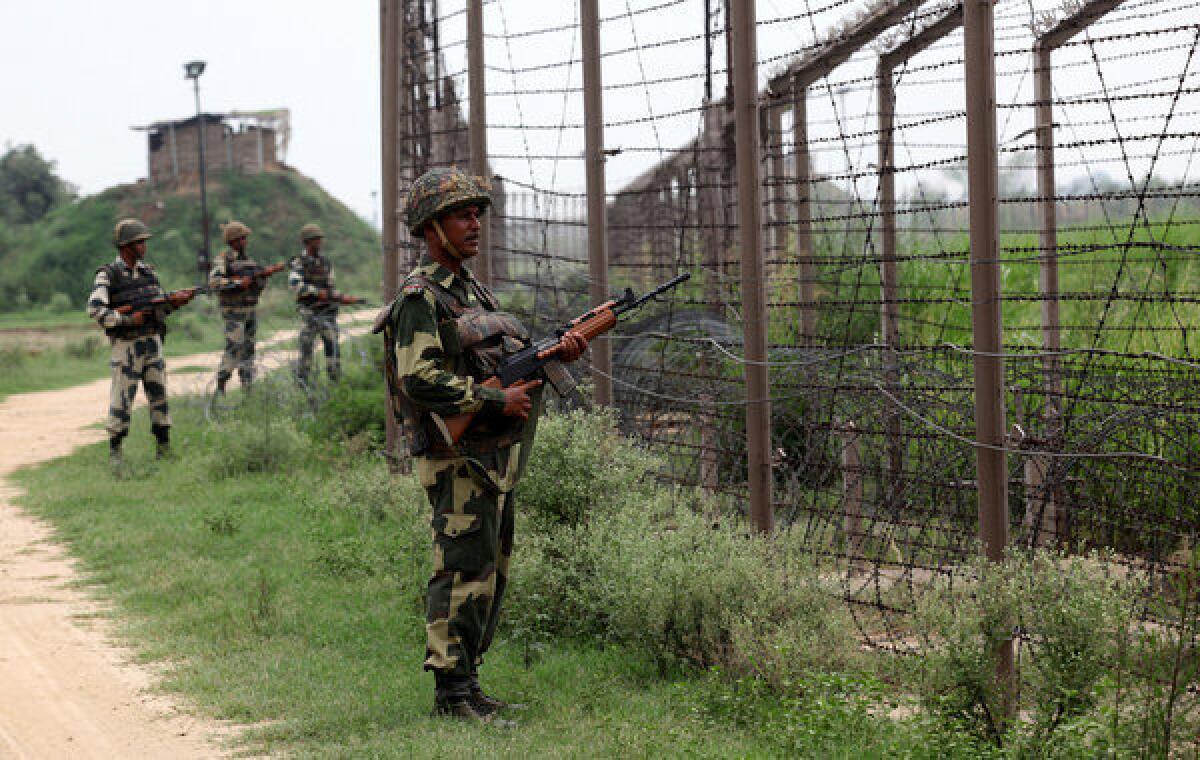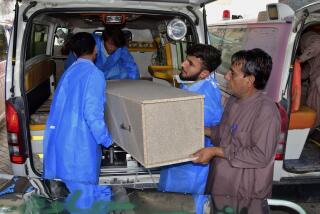India accuses Pakistani troops of killing two soldiers

NEW DELHI, India -- Indian army officials said Tuesday that two of their soldiers were slain by Pakistani troops who attacked an Indian military post in Kashmir, the second fatal clash in the divided region in two days.
The incident is likely to further heighten tension at a time when the two wary neighbors have been working to improve relations following the 2008 attack on the Indian city of Mumbai by Pakistan-based militants.
Maj. Gen. S.L. Narasimhan, a spokesman for the Indian army, told reporters that one of the slain soldiers’ bodies was badly mutilated. News reports, citing army sources, said at least one of the bodies was beheaded, while A.K. Sahu, area deputy police commissioner, said Pakistani troops “slit the throats of two [Indian] army soldiers.”
Pakistani troops slipped into the Indian-controlled portion of Kashmir, where they encountered an Indian patrol in the Poonch district, the Indian army said in a statement.
“Pakistan army troops, having taken advantage of thick fog and mist in the forested area, were moving toward [our] own posts,” it added. “The firefight between Pakistan and own troops continued for approximately half an hour after which the intruders retreated back toward their side.”
In a statement, the Pakistani military, without elaborating, denied “the Indian allegation of unprovoked firing.”
India vowed to raise the issue “sternly” through diplomatic channels, with the military calling it “a significant escalation to the continuing series of cease-fire violations and infiltration attempts supported by [the] Pakistan army.”
Other army officials said at least two soldiers were hospitalized with injuries.
The incident follows the reported killing Sunday of a Pakistani soldier by Indian troops, raising the prospect that this was a retaliatory move. In the earlier incident, both sides claimed the other country’s troops had violated their territory.
On Monday, concerned that the first attack could spin out of control, the U.S. called on India and Pakistan to end their exchange of fire and resume normal trade and travel. The two nuclear neighbors have fought three wars, including two over Kashmir, since they gained independence from Britain in 1947.
There were 70 reported cease-fire violations last year across the line of control that separates the two portions of Kashmir, according to India’s Home Ministry, leading to the deaths of four security personnel and three civilians.
Historically when one side suffers a loss, as happened Sunday, the other side is often motivated to hit back.
The area has also seen its share of incursions by militants. “It can be a lively place,” said Salman Haider, a former foreign secretary of India. “This is not a good development.”
The two countries have established mechanisms over the years to help prevent incidents from spinning out of control. Local commanders across the line of control can call for a “flag meeting,” analysts said, to prevent misunderstanding, ease tension and work out protocols. The directors-general of military operations on both sides can speak by hotline about bigger problems. Finally, there are various political and foreign ministry channels.
So far, the tensions seem to be contained along a relatively limited section of the line of control, analysts said, although the potential for escalation is always there given the two nations’ long history of distrust and the close proximity of troops.
The reported mutilations add a disconcerting element, analysts said, perhaps suggesting that militants may be at least partially involved. “Armed forces don’t mutilate each other’s bodies,” Haider said. “These are disciplined forces on both sides. It could be mujahedin-type forces or a mixed force.”
The incidents follow a slow period of rapprochement between the two countries in the wake of the Mumbai attack that killed 166 people, sowing deep distrust. New Delhi has repeatedly accused Pakistan of doing little to investigate or bring to justice Pakistan-based militants who masterminded the operation. Islamabad has countered that India’s evidence is insufficient.
In recent months, the two sides have restarted talks, eased visa and trade restrictions and resumed cricket matches, with a running joke that the line of control’s abbreviation actually stands for “love of cricket.”
Analysts expressed hope that the latest deaths would not derail the general warming of relations. “These incidents can be very tricky and have consequences,” Haider said.
ALSO:
Suspects appear in court in Indian rape case
Afghan leader heading to Washington for talks
British soldier in Afghanistan victim of apparent “inside” attack
Magnier reported from New Delhi and Rodriguez from Islamabad. Tanvi Sharma in the Times’ New Delhi bureau contributed to this report.
More to Read
Start your day right
Sign up for Essential California for news, features and recommendations from the L.A. Times and beyond in your inbox six days a week.
You may occasionally receive promotional content from the Los Angeles Times.






